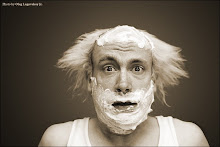"The work I have been doing in the Lab over the past 6 months has shed some light on many of the natural processes which cause us to freeze up or become "too clever" onstage.
One of the most fascinating things I have been focusing is behavior emerging specifically from Objective Encounter (object-event) during Play. Whether the actor is in a deep-play state or a state of presenting the scenario , "manner" of play often dictates the degree of truth and reflex in the objective encounter.
What am I talking about?
In the first encounter with any "object" there is a fundamental process of sensate exposure, exploration, evaluation and discovery.
It is known that, upon encountering an object for the first time, we are silent of our own accord. We cannot give a name to something which has no name. The 'thing' must be evaluated, inspected, understood. And it is this process of encountering, exploration and discovery that we create language for the object, or "object-event."
Over the course of collecting experiences and learning and living and developing, we become familiar with items and people and scenarios which were at one time new to us. Through this process our brain begins to quantify common or recurring experiences. New research suggests that the details surrounding recurring object-events become generalized into packets. Meaning, essentially, that the overall experience takes a form or shape which can be easily stored into memory. Research also suggests that this process can produce different "formal packaging" in different brains. Intriguing stuff. One thing that is most common, however, is that almost everyone loses details from the first time they have an experience, upon revisiting the same object-event.
In general, over time, we formulate expectation upon the total sum of the experiences we have accumulated over time. And it is this which further informs our tendency and, ultimately, our choices and actions.
Underlying the obvious, in each of us there remains a fundamental body of instincts which drive our most basic physical behavior. We hear a gunshot, do we turn to see, step toward and breathe out, or step back and breathe in? The reflex may differ under differing circumstances, and certainly for different people. Taking into account observable action which is born from real life objective encounter, together with the way that we packet information, I have been exploring the problem of re-claiming the details which are lost in the process of "packeting" object-events into "non-invasive experience." The work has been very revealing and quite interesting.
Whenever you encounter something (whether for the first time or not): an object, another person, a change in situation or environment, for example, you undergo a transformation. A very fundamental instinct emerges which deals with 'threat' evaluation. And it is in this natural, often miniscule impulse that we have the possibility to regain control of our primary, innate reflexes (think "triggers") for "giving language" to that which is has no name.
...In other words, through awakening the Play instinct and readressing the object event through the right brain, we are finding ways to re-wire, or re-package, common non-invasive experience into bundles which are rich with detail not present in the logical modeling."
--clown journals, spring 2008
Sunday, June 1, 2008
Subscribe to:
Comments (Atom)
